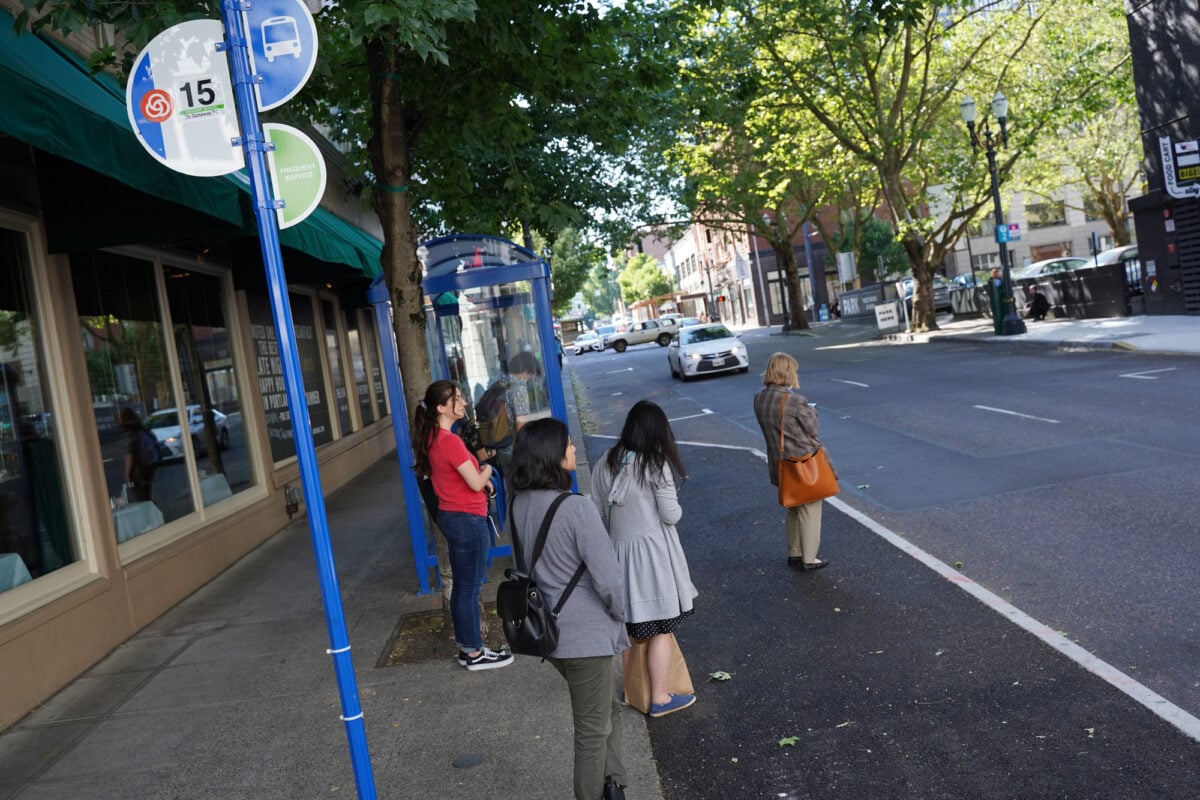
TriMet, Portland’s regional transit agency, has taken on an intense marketing campaign, touting their benefits in employee testimonial ads on YouTube and social media posts to reel in potential employees to fill the bus and light rail operator deficit they’ve been dealing with in the wake of the pandemic.
But despite the ad blitz, increased pay and hiring bonuses TriMet has offered, their worker shortage appears to be getting worse, not better – they just can’t hire enough people to make up for the staff lost in the last several years. Last week, they announced they will reduce or cut service on 10 bus lines starting this fall because they don’t have the staffing required to maintain the routes. TriMet says these cuts will be temporary, but there’s no telling when they’ll have the staff to bring back full service.
“We can’t compare this to anything else,” Tyler Graf, a Trimet Public Information Officer, told BikePortland on a phone call last week. “This is a unique situation we’ve never faced before.”
While many factors are at play and TriMet is just one of many transit providers nationwide struggling with this problem, union leaders say the agency needs to accept more responsibility for their role in the crisis.
A history of low morale
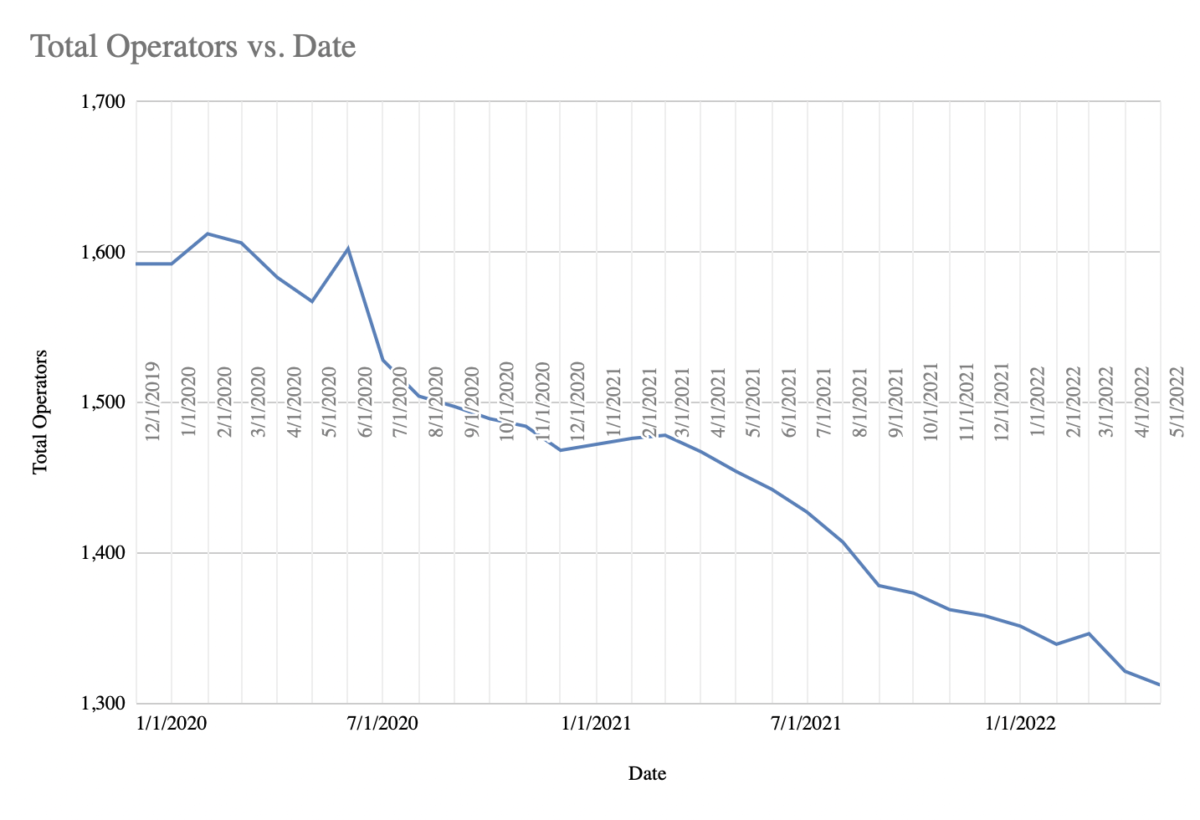
“[TriMet’s] attitude about discipline was, ‘There’s no shortage of workers.'”“
– Fred Casey, Amalgamated Transit Union Local 757
TriMet data indicates operator staff levels have declined steadily over the last two-and-a-half-years. In the period between December 2019 and May 2022, staffing levels peaked in February 2020, when TriMet employed 1,612 total bus and light rail operators. As of this past spring, TriMet’s staffing levels are the sparsest they’ve been throughout that period: a May 1 count tallied 1,312 total bus and light rail operators, with the biggest loss coming from the bus driver category.
What’s to blame for the shortage? Fred Casey, the Vice President of Amalgamated Transit Union (AMU) Local 757 which represents TriMet employees, said there’s not just one cause to point to.
Casey said there have been tensions between the union and TriMet for years over a myriad of issues. (The Northwest Labor Press’ TriMet archives are a great resource for details on more than a decade of this turmoil.)
“Up until very recently, the relationship has been acrimonious, and not because of a lack of trying on our side,” Casey said on a recent phone call with BikePortland. “The relationship got really sour during [former TriMet General Manager Doug Kelsey’s] tenure, and the morale took a real bad hit to the point where there’s zero morale at TriMet now.”
TriMet bus operators have experienced abuse and even assault from passengers, which has become more severe during the pandemic. Some drivers don’t think TriMet is doing enough to help them.
Patrick Coomer, a TriMet bus operator who runs a blog called “From the Driver Side,” described TriMet’s attitude toward drivers during the pandemic in a May 2020 post, saying the transit agency took the customer’s side in disputes at the detriment of operator safety. He wrote that TriMet was “intent on protecting everyone but the operator” with their Covid policies and drivers didn’t feel safe because they’d be punished if they “denied boarding to any pseudo-badass who refuses to wear a mask.”
Recent management changes at TriMet have given union leadership some hope of a better relationship going forward. Casey said Sam Desue, who was appointed General Manager last summer, has expressed more interest in having an amicable relationship with the union. They’ve just successfully negotiated an extension of the current union through November 2024, which will maintain the current contract but include wage increases.
But Casey said even though the relationship between ATU and TriMet may be on the up-and-up, he isn’t completely impressed by their recruiting tactics. One concern he has is that the agency is trying so hard to hire new operators they are neglecting and overworking the people already on staff.
“The current workers there are being overworked. [They’re] working several extra hours a day or week to cover shifts because they don’t have the staffing levels to get the service out,” Casey said.
Casey also told us employees felt a crackdown on disciplinary measures under recent management who had created a culture of fear, which worsened during the pandemic.
“Suddenly, these operators were getting hit with reprimands and suspensions and eventual terminations for things that they had never done before,” Casey said. “[TriMet’s] attitude about discipline was, ‘There’s no shortage of workers.'”
Are beggars being choosers?
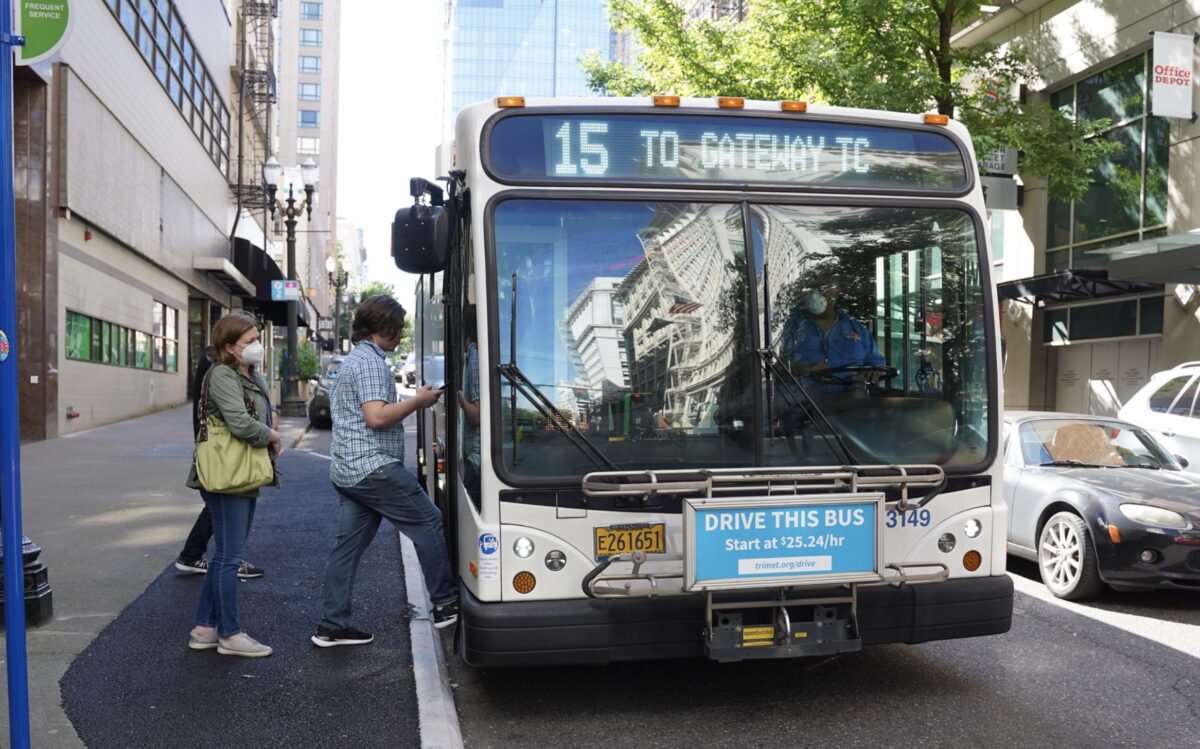
According to TriMet Public Information Officer Tia York, the agency has received 1,468 bus operator applications in 2022 so far – well above the 300 person deficit they need to restore pre-pandemic staffing levels. But only 88 of these applicants have actually been hired to date.
This discrepancy shocked me: If their worker shortage is so dire, why isn’t TriMet hiring more people who apply?
Casey doesn’t think they’re being completely upfront about the incentives TriMet has offered potential applicants, which has led to an uneven ratio of applicants to people hired. In their ad campaign, they’ve promoted a $7,500 hiring bonus and a starting wage of $25.24 per hour to potential applicants, which come with some caveats. New hires don’t get the $7,500 all at once – it’s doled out over three years – which makes sense as a way to incentivize retention. But it appears some applicants decide not to move forward with the hiring process after reading the fine print.
In an email to BikePortland, York said many people have applied for the job to keep their unemployment benefits, which requires them to apply for a certain number of jobs each week, which has resulted in “some applications from people who have no real interest in working at TriMet.” (I want to note here that labor experts say unemployment benefits don’t keep people from returning to work, especially since the benefit program beefed up during the pandemic came to an end back in the fall of 2021.)
Another reason many applicants drop out? The onboarding process may be more than prospective hires thought they signed up for. York said there are a “number of requirements that must be met before a candidate can begin training.” Applicants are required to have a clean driving record for the past three years and a commercial driver’s license (CDL) (TriMet will help with the CDL permit test). They also must pass a pre-employment background check, drug screen, medical exam and complete an employment and reference check. TriMet says many of the applicants weren’t able to make it through this process.
Hampering long term goals
This shortage comes at a time when TriMet is engaged in major projects like the Division Transit Project and A Better Red and has plans for more transit service improvements to meed ridership demands. As gas prices continues to rise, public transit use is trending upwards, which could be a huge boon to climate and transportation advocates who want to get people out of single-occupancy vehicles.
“We have tempered optimism about our ability to address this in the coming months.”
– Tyler Graf, TriMet
But without enough operators to keep the buses moving, it’s going to be difficult to see these visions through.
Don Iler, a TriMet operator and public transit advocate, urged the agency to up the effort to improve conditions. He shared his concerns on Twitter last week about what the staff shortages will mean for recouping ridership lost to the pandemic and bringing more passengers aboard, calling the problem “a shitstorm that will take years to fix.”
Iler’s advice to TriMet: “Make this job so lucrative it’s competitive to get. Bring back the pension, pay all health care premiums, restore retiree health benefits. Also TriMet needs to increase the pay of long serving operators today in order to stem the exodus. More money might convince people to stick around longer. Offer retention bonuses to everyone, offer those nearing retirement cash to stay longer until more can get trained.”
TriMet said they were careful when selecting which bus lines to impact with cuts. They chose routes “with an eye on preserving service in areas with high concentrations of people with low-incomes and communities of color,” and based decisions on ridership trends and data. It’s not clear how many people will be affected by these service reductions. Even if these particular changes will have minimal practical impact, the broader implications may be severe. People will have to choose other methods of transportation if buses aren’t reliable or if their service is cut off entirely.
But TriMet isn’t despairing yet. They’re holding onto hope that changes will encourage more people to apply and stay on board.
“We have tempered optimism about our ability to address this in the coming months. It will take a little bit of time and we want to acknowledge that and make sure our riders understand,” Graf said. “It’s important that our front line and mission critical staff feel valued and appreciated. Operators are the lifeblood of the agency. Now’s the time to get in on the ground floor and join the movement.”



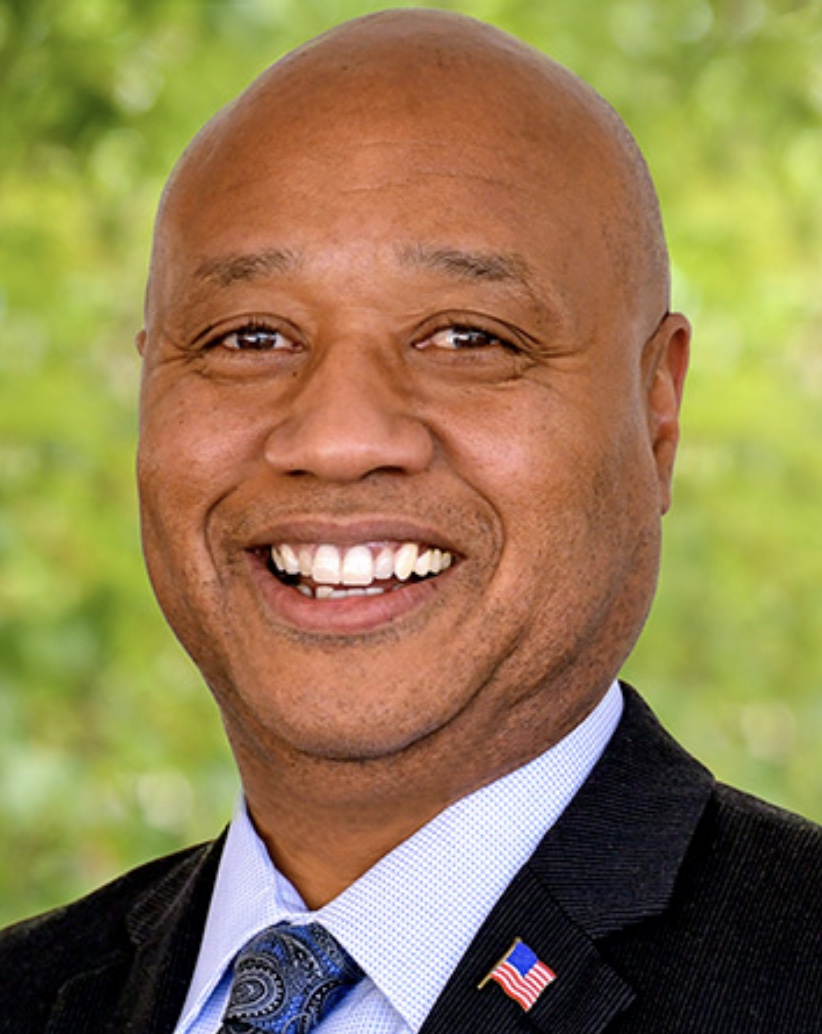
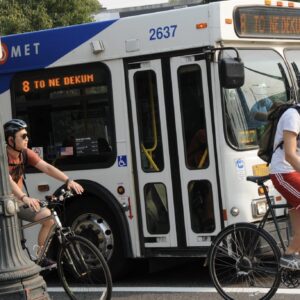
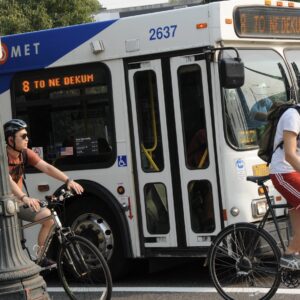
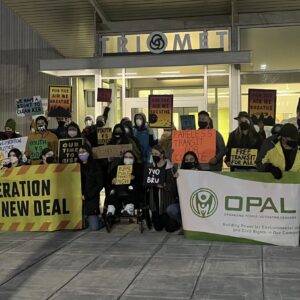

Thanks for reading.
BikePortland has served this community with independent community journalism since 2005. We rely on subscriptions from readers like you to survive. Your financial support is vital in keeping this valuable resource alive and well.
Please subscribe today to strengthen and expand our work.
I can’t speak for the buses as I haven’t been on one in over 3 years, but what about passenger, in addition to driver, safety on the trains? TriMet really needs to make trains and buses safe again. Fares only and following the rules. I can’t count the number of times I felt unsafe, and I’m not shrinking violet, on the train because of the unstable folks that are allowed to ride.
I’m so done with “Portland nice.”
The link suggesting transit use is trending upwards made this claim based on this data:
https://toddwschneider.com/dashboards/nyc-subway-turnstiles/
June 18 numbers are close to the same period in 2021 even though NYC had substantial Covid-19 restrictions in place at that time.
I can’t understand how someone could look at that data and glean even a little bit of optimism about the future of transit in the USA.
The age of everyone needing to head downtown at peak times is dead due to working from home, yet transit in the US is built around that expectation. Transit will never get close to the same ridership again till we reshape transit
I agree and this comes down to something that has always been lacking in the USA: funding and political will. Even in NYC, the only USAnian city with decent transit mode share, ~97% of the subway system is greater than 88 years old.
That seems to be part of it for sure. I used to work downtown and took the bus regularly, now I haven’t commuted there in years.
What kinds of things are you thinking of in terms of reshaping transit? What do you mean?
The 19th century model of public transportation just doesn’t work well in the post-covid universe we’re living in.
When the so-called Spanish Flu hit during WW1, transit ridership took a similar hit. Within 5 years transit ridership was back to normal, even up a bit, in spite of the rising popularity of the automobile. However, most cities’ electric trolley systems were replaced by cheaper-to-maintain buses by then.
The same forces and issues that drive public transit are still there – congestion, pollution, parking restrictions, personal transportation costs, high-density living – covid or no covid, and public transit ridership will recover, probably by 2024 or 2025. We’ve got about 2-3 years to make the adjustments needed, not a lot of time.
But given the changes – video conferencing is now commonplace, severe transit employee shortages, the rise of remote-controlled vehicles and drones – I’d say our transit networks are likely to be radically revamped and our drivers and dispatch personnel replaced with machines, much like the Vancouver BC Skytrain.
Transit is already being slowly bled dry by TNCs and these disruptive unregulated innovations make it unlikely that middle- and upper-income people will return to transit en masse. I guess one could re-define publicly subsidized TNCs as “transit” and I’m sure that google/waymo/lyft, GM/cruze/uber, and apple will spine their future dominance in that manner.
I just want to emphasize how much I loathe TNCs. These parasitic unregulated transit-destroying venture capitalist scams should be either be banned or regulated into submission.
More than half of American hourly job applicants can’t pass a drug test. One third of American white adult males live at home with their parents. Most play video games all day to pass the time.
America’s future looks more “interesting” every day.
> More than half of American hourly job applicants can’t pass a drug test.
When they test for weed, of course that number is going to be high.
> One third of American white adult males live at home with their parents.
Seeing housing as an investment, alongside failure to build housing of all types means living with parents is the only way to afford to live here.
> Most play video games all day to pass the time.
So what? People have hobbies.
Lets stop trying to victim blame the working class and suggesting that they need to be perfect citizens.
I’m gainfully employed and have been since I was 14 and I can’t pass a drug test. I know there’s weirdness with the feds but when you screen out all users of the healthiest mind-altering substance, you’re going to be in trouble. The Greatest generation and boomers drank their way through work and now want to look down on young people for smoking a little weed.
It’s those dern lazy kids! All we have to do is ignore that economic pit that is the job market and ungodly high home and rent prices, it’s all their fault!
If I had the deck as stacked against me as much as the zoomers do, I’d probably play video games all day too. Why play the game when winning is impossible?
That’s why I stay away from video games.
I am interested in knowing why you think winning is impossible. I have my own perspective on this, but would be curious as to yours. thanks
This is the reality, it seems. Any low-paying job that requires a negative THC pee test is going to have trouble hiring people. Trimet should reconsider that specific requirement. I don’t care if my bus driver smokes pot after work. It would probably help them deal with the insanity they encounter on a daily basis.
Trimet should reconsider that specific requirement.
Good luck – it’s a Federal Department of Transportation requirement.
Put in place after a locomotive engineer ran red signals and allowed his engines to get in front of a high-speed Amtrak train, and blamed it on drug use. See <a href=”https://en.wikipedia.org/wiki/1987_Maryland_train_collision”>1987 Maryland train collision</a>. The saving grace was that the front Amtrak cars were mostly empty, or many more would have been killed.
If you want the job, don’t take drugs. Pretty simple actually.
Where do you get these so-called statistics?
“New hires don’t get the $7,500 all at once – it’s doled out over three years –”
Good Lord. So what they are really offering is a guaranteed pay cut after 3 years on the job. Who actually thought that was an incentive?
Hmmm… Yes, that’s one way to look at it. Are they doling it out in $200 monthly increments? That’s the equivalent of about $1.25/hr pay. So maybe at the end of the first three years, they need to give a raise of $1.50/hr?
There are guaranteed raises in the contract (though they now come later as they raised the starting pay by eliminating the first steps). Current top rate in the contract is $33.65, and that does not include the raise that is currently being agreed upon, or if the person takes a promotion such as going to rail.
So, they should offer $7,500 up front and watch people leave the moment they get it?
My opinion of TriMet management is already pretty low, but even I don’t think they’re *that* stupid.
They could definitely come up with something better than what they’re doing. $1000 up front, $2500 after a year, $4000 after two years. Something like that. Something that doesn’t feel like a $1.20/hour pay cut after 3 years. They do it with other jobs, like when they offer stock benefits but you only get them when you’re fully “vested” which is just gobbledygook for “you’ve worked long enough we got more value out of you than we’re giving back”.
Most sign on bonuses have a claw back clause so you get it all at once but have to pay back a certain amount if you leave before a certain time
I believe this is what the city is doing for police officers
Not a net cut. There are guaranteed pay raises that would take affect by then.
Seriously. I signed on to drive truck for a company that offered $10k. It was paid out over 13 months. 3 years for less seems excessive.
did you get on the job training for your CDL? Trimet is going to be investing heavily on getting these new drivers trained and paying for their CDL. 3 years makes total sense to me- it’s a huge commitment to train them
I wonder if this includes weed, because if so I think I’ve found a big part of the problem. It’s ludicrous to screen for weed. It’s simply the fact that it’s easy to test for that they do this. Like, if alcohol could be detected for weeks after a drink, that would be a more valid drug to screen.
For that matter, none of the drugs they can screen for should really make any damned bit of difference for doing their job. If they’re not high on the job, what they do in their personal time is none of my business.
Weed on the weekend is one thing, but a driver who shows up for a day driving after a wake-and-bake morning is unacceptable. I don’t think tests for weed can determine when the drug was taken.
Right, which is why they shouldn’t do the test.
Do they make drivers do a breathalizer test at the start of the day, and at multiple times throughout the day? If not, why not? If all a weed test shows is that they smoked some time in the last month, it’s a useless test. If it doesn’t stop a driver from smoking a joint on their mandatory break they take every so often, it’s theater. And invasive theater at that.
Drug testing is a Federal mandate, Put in place after a locomotive engineer ran red signals and allowed his engines to get in front of a high-speed Amtrak train, and blamed it on drug use. See 1987 Maryland train collision. The saving grace was that the front Amtrak cars were mostly empty, or many more would have been killed.
It includes marijuana due to federal policy. This is also an issue for recruiting truck drivers:
https://www.transportation.gov/odapc/dot-recreational-marijuana-notice
“State initiatives will have no bearing on the Department of Transportation’s regulated drug testing program. The Department of Transportation’s Drug and Alcohol Testing Regulation – 49 CFR Part 40 – does not authorize the use of Schedule I drugs, including marijuana, for any reason.
Therefore, Medical Review Officers (MROs) will not verify a drug test as negative based upon learning that the employee used “recreational marijuana” when states have passed “recreational marijuana” initiatives.
We also firmly reiterate that an MRO will not verify a drug test negative based upon information that a physician recommended that the employee use “medical marijuana” when states have passed “medical marijuana” initiatives.
It is important to note that marijuana remains a drug listed in Schedule I of the Controlled Substances Act. It remains unacceptable for any safety‐sensitive employee subject to drug testing under the Department of Transportation’s drug testing regulations to use marijuana.
We want to assure the traveling public that our transportation system is the safest it can possibly be.
December 3, 2012″
Hmm, so I assume this is something that can’t just be ignored? It’s frustrating, because this is the kind of thing some Republican state would simply ignore these days, and they would be right to do so in this situation, this is a case where a state’s government is more progressive (better) than federal.
But, it sounds like this is the reason for this nonsense. Another failure of the Biden administration to do anything about federal policy.
The only time I’ve ever seen a passenger acting out of control on public or private transit (Greyhound, tram, mass transit, anything) was earlier in 2022 when a guy wanted to bring tons of items on TriMet bus 54 in rush hour.
How often do you ride transit?
I hope the reporter realizes that pieces like this are just part of the union bargaining process. The Union head advocates for his brethren, looking for more money and benefits. Tri-Met defends itself; the reader is left scratching his/her head. Maybe go beyond he said/she said and compare the situation in Portland with other similar cities. Otherwise, you are just being used by ‘waring parties’.
Drivers have complained for years about the same problems. Lack of support, passengers are always right, etc. The feeling of being underappreciated has been sown for a decade with management.
What’s new: the heightened danger faced by the drivers as a result of [1] our exploding drug scene and [2] the removal of fare enforcement officers.
The union us just as much “responsible ‘ as TriMet, for “Operator shortage. ” They are both irresponsible with Drivers/Operators. No protection from the union…..no support from TriMet.
I ride trains and buses all the time and this article rings true. Just the other day a woman on the Green Line screamed racial epithets at Black people on the train and threw garbage around. Just a few years ago, this type of behavior was less tolerated. Cops would routinely get on the train and it was amazing how quickly everyone who was driving everyone nuts suddenly started behaving. Now there are more and more violent angry riders who start confrontations, hit windows, etc. and so on. It’s extremely tiresome, but if you can’t afford a car and need to get to work, you just kind of deal with it all the time. One angry lady threw coffee one day on me and other passengers. I’ve seen guys pulled off for having guns and numerous people who come on with profane music blasting and creepy men who harass women. Sooner or later there’s going to be a truly violent incident that will shake the city, but as long as we’re caught between leftwing activists who actually think we don’t need police and rightwingers who despise public transit (as they benefit from the low income folks who take care of their relatives, work in their businesses, etc.) we’re stuck. Portland is ungovernable because we have a dearth of grownups. It worked okay when things weren’t so grim in our country, but we can’t afford to be trapped by “activists” anymore who can never run anything save their own mouths.
“ Sooner or later there’s going to be a truly violent incident that will shake the city…”
Are you kidding me, two people were killed and one badly wounded in 2017 by Jeremy Christian.
Its already happened.
You can listen to all of the grief that TriMet operators have to deal with. Another issue is that the board is controlled by the Governor, who has many other issues to deal with, and not always responsive.
This is an important point. The democratic governor’s office is responsible for the pathologically undemocratic governance of trimet and for trimet’s unwillingness to address the decay of Portland’s transit system. And please remember that trimet has powers of taxation so it alone could begin the process of modernizing and reforming this broken system.
Trimet can only levy a payroll tax iirc, and that levy has a cap. Any change in the payroll tax can only occur in 0.1% intervals. They had to get permission from the legislature when they wanted to raise the tax above that cap in 2016. They won’t have the full increase until 2025. I do think they should be given much more leeway in their maximum limit and rate of increase.
I did find a nugget of possible truth in this article. The requirement for a CDL is a fairly big deal. Getting one takes a commitment. And, the long-haul average pay in the U.S. is over $70K. Up against Tri-Met’s $50K, that is a big deal. When the union leader said ‘just pay more’, he did have a point. A lot of long-haul drivers would love to come home every night, and maybe $20K a year would incentivize them. Of course, it is not that simple like ‘where does the millions of extra dollars come from’, and ‘what happens if lots of truck drivers become bus drivers?’
A big piece of this picture is the on-the-ground reality of street conditions in Portland (and perhaps elsewhere to a lesser extent). No one could pay me enough to deal with the preponderance of drug addicts, belligerents, criminals and others roaming the streets of Portland and using public transit. Obviously that’s not everywhere in the city, but just about every bus route goes through downtown Portland and I’ve seen these street conditions there and elsewhere. Unlike some of the other commenters, I’ve been riding buses and MAX lately and it’s all too common an experience to dismiss. For a variety of reasons, Portland seems to be hit hard in this regard. That’s not TriMet’s fault or the unions.
The “customer is always right” policy doesn’t cut it anymore. There is a glaring and obvious need to focus on the bus operators themselves, who are the most vulnerable service workers in our entire workforce. They need more support, more pay, and more recognition.
It’s a catch 22 in the worse way… we drivers need more security… but there is a lack of security and police staffing… so passengers don’t feel safe like they did pre 2020.
As a driver, I was greatly impacted daily as I drove through riots, Covid, assaults, crazy people, trouble makers, zombie meth addicts, bored youth needing something to let out steam during the pandemic, … the list goes on.
I remember distinctly while driving until 2:30 am every night through downtown… outside my window was the film “Mad Max” playing a long run show.. every night for 18 months!
And so I went part time, just to stay sane. Things are getting better… but it’s sssslllloooooowwwwwwwww!
The condition this city is in will not be solved anytime soon. Even if the city banned tent camping, which they should, who would enforce it? The police can barely handle the big crimes as it is….
Overzealous liberal policies drained the city of the protection we had… and this is coming from me… who calls himself a progressive liberal!
We need a balance of good healthy social programs, coupled with tough-love policies, with accountability to everyone from the police to the politicians, to the public, and to the street people.
As it is currently, we are just one big constant enabler. No politician in office now, has the guts to say “enough”. What we were doing in the past is clearly not working!
But I see hope… hope at Trimet with our new CEO, hope with the new Managment, hope with the system turning around… even though it’s extremely sloooowwwwww.
But We need to solve security first!
After all, what good is a transit system when everyone is afraid to use it?
I’ve worked at TM for 7 years. Believe the union when they say morale and discipline are the main issues driving this shortage.
Morale is basically through the floor. TM treats us worse than the drug addled homeless who make our lives hell on the daily as they have for years, confident in the belief they can continuously draw from a pool of applicants desperate and ignorant enough to sign up for this nightmare job. Promotions based seemingly only on “identity”, a board intent on virtue signaling into oblivion and a layer of frontline managers who have no experience operating but have a degree in Public Administration is the root of the problem.
Well, looks like their number is up.
I’m about to join the ranks of those formerly employed. I’m doing it because of the toxic and abusive culture of fear and lack of support in the face of a lawless and unhinged ridership.
What is going on here? You’re literally in a union, if things are that bad go on strike. Way better than just quitting. Quitting does very little to change the status quo.
If the union leadership won’t do it, organize a wildcat strike. Unions have power because the people in the union do things, not because they exist. The leadership isn’t the union.
Trimet union is only on name…they gave the right to strike years ago.
A view behind the bus driver anywhere east of Vienna: it is illegal for the bus driver to talk to or give advice/check fares etc. There’s a partition there. You don’t have fare, you’ll play Russian roulette with beefy fare checkers (4 of them usually). You give them lip, they’ll fatten your lip and haul your rear end to the cop shop. Somehow busses are not full of crazed vagrants… BUT you may get pick-pocked if it’s busy.